- Home
- Susanna Kearsley
The Splendour Falls
The Splendour Falls Read online
Copyright © 1995, 2014 by Susanna Kearsley
Cover and internal design © 2014 by Sourcebooks, Inc.
Cover design by Laura Klynstra
Cover image © Ilona Wellmann/Trevillion Images
Sourcebooks and the colophon are registered trademarks of Sourcebooks, Inc.
All rights reserved. No part of this book may be reproduced in any form or by any electronic or mechanical means including information storage and retrieval systems—except in the case of brief quotations embodied in critical articles or reviews—without permission in writing from its publisher, Sourcebooks, Inc.
The characters and events portrayed in this book are fictitious or are used fictitiously. Any similarity to real persons, living or dead, is purely coincidental and not intended by the author.
Published by Sourcebooks Landmark, an imprint of Sourcebooks, Inc.
P.O. Box 4410, Naperville, Illinois 60567-4410
(630) 961-3900
Fax: (630) 961-2168
www.sourcebooks.com
Originally published in 1995 in Great Britain by Corgi Books, Transworld Publishers Limited. This edition based on the paperback edition published in 2012 in Great Britain by Allison & Busby Limited.
Library of Congress Cataloging-in-Publication Data
Kearsley, Susanna
The Splendour Falls / Susanna Kearsley.
pages cm
“First published in 1995 in Great Britain by Cori Books, Transworld Publishers Limited. This edition based on the paperback edition published in 2012 in Great Britain by Allison & Busby Limited.”
(pbk. : alk. paper) 1. Cousins—Fiction. 2. Treasure hunt (game)—France—Fiction. 3. World War, 1939-1945—Fiction. 4. France—History—German occupation, 1940-1945—Fiction. 5. Chinon (France)—Fiction. I. Title.
PR9199.3.K4112S68 2014
813’.54—dc23
2013031053
Contents
Front Cover
Title Page
Copyright
Prologue
Chapter 1
Chapter 2
Chapter 3
Chapter 4
Chapter 5
Chapter 6
Chapter 7
Chapter 8
Chapter 9
Chapter 10
Chapter 11
Chapter 12
Chapter 13
Chapter 14
Chapter 15
Chapter 16
Chapter 17
Chapter 18
Chapter 19
Chapter 20
Chapter 21
Chapter 22
Chapter 23
Chapter 24
Chapter 25
Chapter 26
Chapter 27
Chapter 28
Chapter 29
Chapter 30
Chapter 31
Chapter 32
Chapter 33
Author’s Note
About the Author
Back Cover
For my wonderful agent Felicity.
The morning we first met you said this was your favorite of my books, and all these years I’ve thought of it as “yours,” and I have nothing else to give you that you need, so here you are: this is officially Your Book now, with my love and heartfelt thanks for all you do.
The splendour falls on castle walls
And snowy summits old in story:
The long light shakes across the lakes,
And the wild cataract leaps in glory.
Blow, bugle, blow, set the wild echoes flying,
Blow, bugle; answer, echoes, dying, dying, dying.
This and all other quotes contained herein are taken from Alfred, Lord Tennyson’s “The Princess”
Prologue
…when all was lost or seem’d as lost…
The first night had been the worst. They had come on so violently, and without warning. One moment she’d been peacefully at prayer within the chapel, and the next the captain of her guard was pounding at the door, with orders she should seek in haste the safety of her chamber. And then someone had whispered “siege”…
It had been dreadful, that first night—the darkness and the shrieking of the wind and the fires burning everywhere, it seemed, upon the plain below. But daylight came, and still the castle held. Of course it held, thought Isabelle. This was Chinon. Like the Plantagenet kings it sheltered, Chinon Castle had a will of iron. It bowed before no man.
At first, she had not wanted to believe that Guillaume des Roches could be so bold, so callous, as to try to hold her hostage. He’d been an ally of the king her husband, and in return he had been used most fairly. Had John not made des Roches warden of Chinon? And yet she’d seen the evidence with her own eyes, she’d seen des Roches himself among the men, striding freely through their ranks as though such treason were a thing to make him proud.
If John were here, she thought, he’d teach the traitor otherwise. If John were here…
She drew the velvet robe more tightly round her shivering body and looked again toward the west. The sun had slipped much lower, now. Already it had flattened on the purple haze of hills, spilling its brilliance into the darkly flowing river. Soon, she knew, there would be only darkness left. Four nights now she had stood here in this high and lonely tower, watching while the dying sun sank weakly in the western sky. This time she found herself looking for the fires, her own eyes seeking out the places where the rebels kept their camps.
“They are quite close, tonight,” she said aloud, and one of her women stirred beside the hearth.
“My lady?”
Isabelle glanced round, her long hair tangling on the crimson velvet. “I said the fires are close, tonight.”
“Yes, my lady.”
“It must be very cold…” She looked away again, thinking on the madness that might drive a man to leave the comfort of his own warm hearth in this, the depth of winter.
Her women were watching her, she could feel their eyes. Her calmness, she knew, surprised them. They thought her still a child, as she had come to them three years ago, when John had brought her here, to Chinon, for the wedding. He’d scandalized the court that summer—she had heard the whispers. A man past thirty marrying a girl of twelve…
But even then, she had not been a child. She had already been betrothed to Hugh of Lusignan when John had met her first at Angoulême. No matter. As in the game of chess, a king outranked a knight, and Isabelle had known from their first meeting how the game would end. Some said that she yet wanted Hugh, but they were fools who thought so. In all her fifteen years, she had loved one man only—a quiet man, a caring man, with midnight eyes that smiled for her alone. And had it been her choice to make, three years ago, she would have chosen John.
He was not like his brothers, not like Richard. She’d met the fabled Lionheart—an armored giant with a beard of gold. The image of his father, people said, the image of the Lion himself, King Henry, that raging intellect who, with indomitable Eleanor of Aquitaine, had bred a line of princes unparalleled in time.
It was, thought Isabelle, the strangest family. They loved and hated one another, wept and warred and plotted, moving always in a weird diagonal between deceit and truth. It had left scars on all of them, especially John. He did not speak of it, but many times she’d seen him standing silent in the chapel here at Chinon, brooding on the very spot where old King Henry, sick at heart, had finally died.
’Twas rumored it was John’s fault that the Lion ceased to roar—John’s f
ault because he had been Henry’s favorite, and because the king had seen John’s name upon a list of those who stood against him. But Henry’s heart was not so weak, thought Isabelle. He’d fought his sons before, unflinching. He’d dungeoned up his wife. He’d played John and betrayed him until no one could with any certainty say how his feelings lay. And yet John loved him. When he stood so sad and solemn in the chapel, Isabelle had but to look upon her husband’s face to know whose heart had broken there those many years ago.
Still, people would persist in rumors. They whispered now about young Arthur of Brittany, held captive in Rouen for laying siege to the old queen at Mirabeau. John had once been fond of Arthur, his brother Geoffrey’s only son, and Geoffrey, who died young, had been of all the brothers closest in both looks and age to John. But Arthur was not Geoffrey. Where his father had been cunning, Arthur failed to think at all, and his rash behavior left John with no option but to take him prisoner.
And so the rumors shifted, day to day. Arthur of Brittany was free… he was in fetters… he was planning his escape… he was too weak to raise his head… he had been moved in secrecy from Rouen… Some said—she’d heard it only yesterday—that Arthur was already dead, that John had had him killed. What foolishness, thought Isabelle. John could not kill the boy.
She might have told that to the men camped now around the walls of Chinon Castle, if they had been like to listen, since it was for Arthur’s sake that they had come. They thought to hold her hostage for the freedom of the reckless young pretender. Fools, she thought. They knew John not at all.
The wind struck chill through the high narrow window. It had a voice, that wind—half human and half demon, that numbed the soul and turned the heart to stone. Isabelle turned slowly from the dimming view and crossed the great round room to where a smaller window gazed upon the north. The northern sky was deepest blue and full of cloud, without a star to pierce the gloom. Did they have stars, she wondered, at Le Mans? Her message would, by now, have surely reached him. Le Mans was not so very far away. She had but to hold out a few more days, and help would be at hand. Isabelle smiled faintly in the firelight. Even if John had loved her not at all, she knew he would not lose his precious Treasury. Indeed, she might have thought he loved his Treasury above all else, had it not been for the day she’d teased him about it and he’d caught her to him, there in front of everyone, and told her: “You are my treasure.” She could still taste his kiss upon her lips…
Her hand moved, unthinkingly, to the gold and pearl pendant at her throat, and she frowned. “Alice,” she said quietly, over her shoulder, “I would have my jewel casket.”
“Yes, my lady.” The woman by the fire rose obediently.
“And Alice…”
“Yes, my lady?”
“Which of the servants knows the tunnels best?”
They did not need to ask which tunnels she was speaking of. Chinon Castle was riddled with them. John often said it was a mystery that the walls did not collapse.
“Old Thomas, my lady,” came the answer, finally. “He works in the kitchens.”
“Then I would have him brought to me,” said Isabelle, “without delay. I have need of him.”
The women stared at her, and murmured, but they knew better than to question her wishes. For all her youth, this waif-like figure by the window was yet Isabelle of Angoulême; she was their queen, and she would be obeyed. Old Thomas would be fetched with haste.
Content, Isabelle turned back to the small window and the fires burning brightly on the blackened plain below. She did not hear the door behind her close, nor hear the footsteps of the women ringing down the cold stone passage. She only heard the wind. She was still standing motionless, her eyes upon the northern hills, when Alice came to set the small jewel casket down beside the bed.
Alice was the oldest of her women, and her gaze fell very gentle on the sad-eyed little queen. “He will come, my lady,” she said softly, and they both knew it was not Old Thomas that she meant.
Isabelle nodded, without words, and blamed the stinging winter wind for the sudden trail of dampness on her face…
Chapter 1
…and thus a noble scheme
Grew up from seed…
“And did he come?” I curled my feet beneath me on the sofa, and poured another cup of tea.
My cousin was idly contemplating my sitting room window, where the raindrops chased one another down the panes in ragged paths. He pulled his gaze back to mine, with an effort. “What?”
“John,” I prompted, patiently. “Did he finally come to rescue Isabelle?”
“Oh.” He smiled. “Naturally. He sent his best knight, Jean de Préaux, with a group of mercenaries, to bring poor Isabelle back safely to Le Mans.”
I pulled a face. “How very noble of him.”
“You would have seen the romance in that, once,” Harry said, passing me his own teacup to be refilled. It was a gentle reprimand. He was quite right, I knew, but I pushed the thought aside.
“So tell me,” I said, “about this new theory of yours.”
“My dear girl, it isn’t theory—it’s been published in three quite prestigious journals.”
“Sorry.”
He forgave me, leaning back. “Well, you remember when they turned up that new chronicle last year, at Angoulême?”
“By William de What’s-his-name? Yes, I remember.”
“Right. It tells us Isabelle hid something when she was besieged at Chinon, something so valuable that she didn’t want the rebel barons to find it. At least we can infer that much. She asked for her jewel case, and then she asked for someone who knew the tunnels, and then she disappeared for nearly an hour with this Old Thomas, to where, nobody knew.”
I frowned. “But surely when the threat was over, she’d have got back what it was she hid.”
“Not necessarily. Chinon was hardly secure, remember, and John lost it completely not long afterwards, so Isabelle might never have had the chance. The chronicle,” he told me, “clearly states that in her later years our Isabelle spoke often of the ‘treasure without price’ she’d left in France. Put two and two together—”
“—and you’ve got your lectures packed with students for the term,” I teased him, smiling.
He grinned. “Not this term. I’m on half-time now, remember? One term off, one on. And this one’s off.”
“Nice work if you can get it.”
“Well, I need the time for writing. I’ve been working on this book…”
“Let me guess. Plantagenets.” That was no great effort to deduce. My cousin Harry had been potty for Plantagenets since we were both in the nursery. I’d paid the price for his obsession many times in childhood games, condemned to die a Saracen at Richard the Lionheart’s crusading hand, or playing Thomas à Becket, a role I thought was rather fun until I learned the fate of the Archbishop. The only truly juicy part I’d been allowed to play was that of Eleanor of Aquitaine, which I’d played often, until Harry one day locked me up in “Salisbury Tower”—an old bomb shelter at the back of his neighbor’s garden—and left me there till dinner time. To this day, it was all I could do to force myself to take the tube in London, or to spend more than ten minutes in my own basement.
My cousin smiled. “Not all of the Plantagenets—just John. A sort of revisionist approach to his biography. The misunderstood king. Which reminds me, did I show you what your father sent me?” Without waiting for my answer, he dug into his pocket and produced a circle of hard plastic, within which nestled a small and perfect silver coin. “That’s John himself, in profile. Must be worth a bloody fortune, but your father just put it in the post.”
I took the encased coin from him, turning it round. “Wherever did Daddy pick this up?”
“God knows.” My cousin shrugged. “Uncle Andrew has so many friends in odd places, doesn’t he? I sometimes think it’s better no
t to ask too many questions.”
I agreed. “He doesn’t answer questions well, at any rate. He’d likely say he bought it at a car boot sale.” He’d say it with a straight face, too, I thought. My father was a charming liar when he chose—a trait that he’d acquired through his lifetime in the diplomatic corps. I’d learned the trick of it myself, these past few years.
“He says,” my cousin informed me, “you ought to ring him more often.”
I looked up, eyebrows raised. “I ring him every month. He is in Uruguay, you know—if we talked any more frequently I’d drain my savings, such as they are.”
“I know. I just think he worries about you, that’s all.”
“Well, there’s no need.” I flipped the coin over to study the reverse. “You’ll be off to France then, I expect, to do more research?”
“Yes, at the end of the month.”
“Just in time for the wine harvest.”
“Precisely.”
I took a sip of tea and sighed. “I’m envious, I really am.”
“So come with me.” He dropped the comment casually, then slid his eyes sideways to watch my reaction.
“Don’t be daft. You know I can’t.”
“Why not?”
“Some of us,” I explained mildly, “do work for a living, you know, and I can’t just pick up any time I like and leave.”
“Give over,” was my cousin’s blunt response. “You work for my dad, for heaven’s sake. I’ll not believe that Braden Glass would fall to pieces if you took a fortnight’s holiday. Surely Dad or Jack could answer their own telephones…”
“And then there’s the house to think of,” I went on stubbornly. “I’m supposed to be looking after it for Daddy, not leaving it unattended so some burglar can break in and strip the place.” I saw his unconvinced expression, and I frowned. “Look, I’m sorry if you think I’m boring…”
“It’s not that you’re boring, exactly,” Harry corrected me, “it’s just that you’re not very exciting. Not anymore. Not since…”
“This has nothing to do with my parents’ divorce. I’m just getting older, that’s all. Taking some responsibility.”

 Every Secret Thing
Every Secret Thing The Rose Garden
The Rose Garden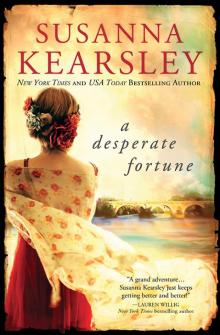 A Desperate Fortune
A Desperate Fortune The Winter Sea
The Winter Sea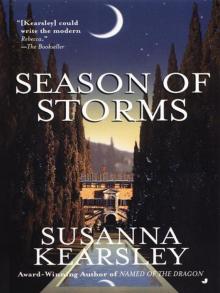 Season of Storms
Season of Storms Mariana
Mariana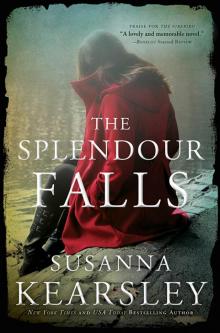 The Splendour Falls
The Splendour Falls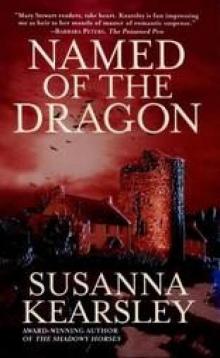 Named of the Dragon
Named of the Dragon Sophia's Secret
Sophia's Secret The Shadowy Horses
The Shadowy Horses The Firebird
The Firebird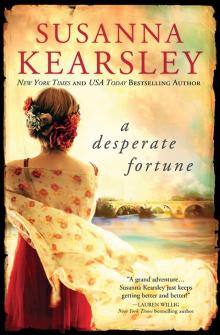 Desperate Fortune
Desperate Fortune